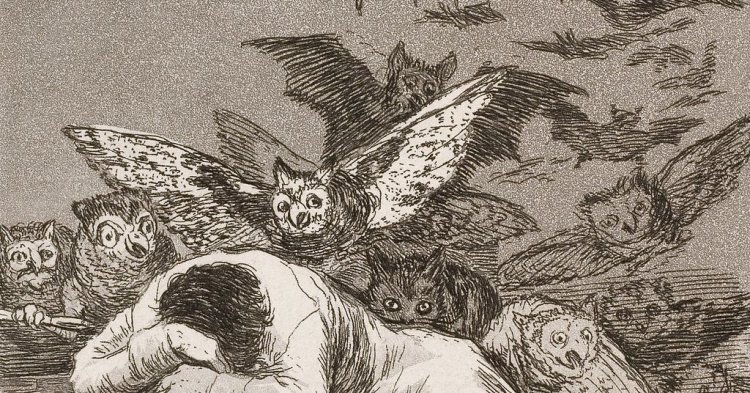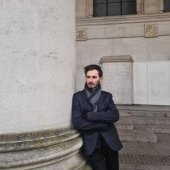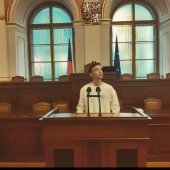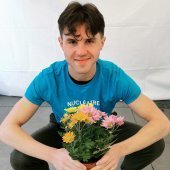Italy - Davide Emanuele Iannace (Eurobull)
The violence in a photo
War never changes, and neither does human nature. The violent invasion of Russia against Ukraine showed to the Western world how fragile the peace it constructed around its border is – because the sad truth is peace was a reality only in our fortress, while conflicts are ongoing in every other continent.
The most shocking reality about contemporary conflicts are not only the powerful weapons deployed, but mainly the pornography of the violence which follow. We are literally flooded with images and videos of violence, real, factual violence. Drones register the destruction of vehicles and artillery positions; cameras showed hospitals going down like sandcastles in real-time.
We are far beyond the reportage, as an instrument to capture the news, to report and inform the population. Social media is literally saturated with images and videos of the ongoing conflicts, which on one hand seems to cauterize the conflict itself, to normalize the violence; at the same time, it seems to grant to every people the right to comment, to talk, to dispute – this is true, this is false, this is not right, this is just. While in Russia the government tries with all its effort to stop the diffusion of any kind of information about the invasion, in the West – and not only there – there is a constant flux of audio-visual material coming from the contested areas. Is this the sense of freedom of speech and press? I don’t think so. I think we are losing our capacity to see a tragic reality and understand the misery of it. Instead, we just follow it behind our screens as if it is a film, a videogame, a show, a survival reality contest, an X-Factor, in which the winner takes his or her life and goes back home.
Understanding the limits of this sad approach to the images coming from Ukraine is a first step to creating a real informed public opinion on the conflict, and the real possibility for the European population to approach it with the respect it deserves, the respect which the victims deserve. Stopping a conflict is a political choice. A political choice, in a democratic country – such as Italy and the European one – finds its reason to exist in the will of the people. People who deserve to know the truth, but must also respect it.
We will mostly continue to see the slideshow of bodies and crumbling buildings, of tanks exploding in bursts of fire and helicopters falling like snow from the sky. Understanding the violence of the images will help people to understand the violence itself, and the necessity to intervene, to act, to stop the meaningless violence of this invasion. Only by facing how indifferent we are to the pain and the ugliness of the world, will we become capable of politically acting to pursue our goal: global peace, global improvement, a global capacity to face the challenges of tomorrow.
UK - Martin Penov (TNF)
Words and Actions: The UK’s Mixed Response to Russia’s Invasion of Ukraine
The United Kingdom is a country which has historically prided itself on its support of humanitarianism. Thinking globally is the basis of Boris Johnson’s post-Brexit vision of a ‘Global Britain’. It may seem bewildering, then, that the UK is the only country in Europe which does not accept Ukrainian refugees without a visa. While Eastern European diaspora communities have come together to organise rallies, launch fundraisers and host charity events, many are wondering why Britain has been so cautious. While Central & Eastern European countries such as Poland, Romania and Moldova have opened their borders to accept over 3 million refugees, the UK has only just begun to ease visa restrictions on the 14th of March after a petition to the Parliament passed one thousand signatures. The response has been disappointing to say the least, and there is an evident gap between what the government says and what it actually does. While many buildings across the country have been lit up in the colours of the Ukrainian flag, such symbolic gestures do not compensate for the fact that the government has refused to waive visas or implement more stringent sanctions against oligarchs in order to target the vast amounts of Russian money in London.
The governments’ inaction has been openly criticised by many, including French President Emmanuel Macron who noted that Britain should live up to its ‘grand statements’. The new ‘Homes for Ukrainians’ scheme has also received a fair amount of criticism for putting the responsibility on British citizens who have been asked to volunteer to house refugees, making Ukrainians dependent on the goodwill of strangers and opening them up to the possibility of exploitation. Regardless of the criticism, the government is unlikely to change its stance soon. Hostility towards migration is nothing new for British politics, with Eastern Europeans all sharing a history of being targeted by British populists and the infamous right-wing media. The ruling Conservative Party also has a long history of accepting donations from wealthy Russian backers, disincentivising the government from following the EU’s sanction regime. As the crisis deepens, more cooperation and unity will be needed between European countries. If the UK truly wants to pursue a global future and retain a good relationship with its neighbours, it will have to adopt the rest of the continent’s stance against the Russian government and show a united European front to support Ukraine’s struggle for freedom.
Portugal - Afonso Morango (TNF)
On 26 February, like the whole of Europe and the world, Portugal awoke to the sound of the trumpets of war in Ukraine. The world will never be the same again and, once more, an armed conflict on a global scale threatens to change the course of history.
In the 1990s, the crisis in Ukraine drove many Ukrainians to emigrate to Portugal. Today, there are around 28 thousand, but in 2008, there were around 80 thousand. There are still between 11 to 12 thousand who already have dual nationality, and are therefore not included in the statistics of the Foreigners and Borders Service. For many, such is the integration in Lusitanian lands, the only thing that denounces the Ukrainians is their accent.
Therefore, and even though Portugal is the westernmost country of the European Union, it is a war that worries most of the Portuguese in a special way. Ukraine has never been foreign to us and now, as Europeans, we are seeing our continent under attack by a dictator who seeks destruction and disorder. Public opinion in Portugal largely converges and, as a member of NATO and the European Union, the country vehemently condemns Putin’s action. On a more local level, the solidarity efforts of Portuguese families are visible, trying to help our European neighbours suffering under the delirium of a war criminal and son of Russian imperialism. Dozens of collections of goods are organised every day and even the most reluctant Portuguese are now paying attention to the news touching on this terrible and catastrophic war.
Poland - Wojciech Zajączkowski (Kurier Europejski)
In the case of Poland the forever question on the links between democracy and war has recently gained a new meaning when the Prime Minister Mateusz Morawiecki and the Deputy Prime Minister Jarosław Kaczyński travelled to Kyiv to express their solidarity with fighting Ukraine.
For a day there was a feeling of the overall consensus ruling the public debate – the sins of the Law and Justice lost their meaning and Kaczyński was representing the whole of Polish society. Is it possible to support the government on some fields and criticize it on others? It is Kaczyński himself who is responsible for the destruction of Polish democracy and rule of law. It’s because of him that women are denied basic reproductive rights and the LGBT+ community was bullied by the police in the summer of 2020.
But in the moment of danger or grief, the Poles have a unique ability to reunite and temporarily forget about the ongoing disputes. That was the case in 2005, 2010 and so it is today. As for March 18th, two million refugees from Ukraine have entered Poland. Civil society continues to provide them shelter and any help they need. The government passed a law allowing the fast-track attribution of social security numbers (PESEL) to the citizens of Ukraine.
It’s okay to support the government in times of crisis. It’s important not to forget to hold it accountable in times of peace.
Greece - Pinelopi Katsigianni, Marillie Giannakopoulou
Greece and Ukraine, since long ago, have shared a lot in common. The traditions, the culture and the religion of these two countries have also helped to build strong diplomatic relations. In addition, Greece is one of the main supporters of Ukraine’s entry into NATO and the European Union. Hence, it is evident that Greece’s reaction would be supportive towards Ukraine.
First of all, the Greek Prime Minister, Mr Kyriakos Mitsotakis declared that ‘No one expected President Putin to take the decision to invade Ukraine, even though we had a notice, mainly from the US intelligence services, that this was what he was planning [...] What is certain is that President Putin has chosen to invade a democratic independent country, violate the inviolability of the borders and effectively impose its own way of life in a neighboring country [...] Greece has sent defense material (two C-130) in order to respond to Ukraine’s request for practical solidarity.’ [1]
Millions of Ukrainian refugees are looking for a safe place to spend the night without the deafening sound of bombing and the sirens of war. Refugee - it is impossible to grasp its significance if you have not experienced it. And yet, although it is a situation that is equally painful for every human being, racial and religious discrimination is once again making its appearance on Greek television. A Greek MP, describing his statement as ’cynical and politically unorthodox’, did not hesitate to declare on national television that ’we are not talking about a massacre in a distant place somewhere in the depths of Africa with irreligious people, but of Christians, whites, Europeans, who are from us, who come from us...’. A view that unfortunately is present today in Greece where racism and bigotry are omnipresent in the daily life of the country. Furthermore, the Greek Foreign Ministry spokesman stated that the Greeks who died in Ukraine were killed by Russian fire and ‘Orthodox bombs killed Orthodox expatriates’.
Despite the conservative commentary, in these difficult times where democracy is under pressure, solidarity with the Ukrainian people was expressed massively in Syntagma Square, in the heart of Athens, where anti-war slogans “Stop Putin” and “Stop the war” were sounded loudly on the first day of March by a crowd of demonstrators. At the same time, the country’s support is also expressed actively, as 8,000 Ukrainian refugees have already arrived in Greece, according to the Ministry of Citizen Protection.
In conclusion, the reaction of Greece was remarkable and important, regarding the circumstances. Democracy is threatened in a place close to the borders of the European Union. Greece cannot act unilaterally. However, all the European member states should continue to react strongly and quickly.






Follow the comments: |
|
